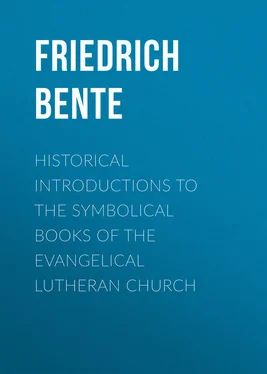Friedrich Bente - Historical Introductions to the Symbolical Books of the Evangelical Lutheran Church
Здесь есть возможность читать онлайн «Friedrich Bente - Historical Introductions to the Symbolical Books of the Evangelical Lutheran Church» — ознакомительный отрывок электронной книги совершенно бесплатно, а после прочтения отрывка купить полную версию. В некоторых случаях можно слушать аудио, скачать через торрент в формате fb2 и присутствует краткое содержание. ISBN: , Жанр: foreign_antique, foreign_prose, на английском языке. Описание произведения, (предисловие) а так же отзывы посетителей доступны на портале библиотеки ЛибКат.
- Название:Historical Introductions to the Symbolical Books of the Evangelical Lutheran Church
- Автор:
- Жанр:
- Год:неизвестен
- ISBN:http://www.gutenberg.org/ebooks/26909
- Рейтинг книги:3 / 5. Голосов: 1
-
Избранное:Добавить в избранное
- Отзывы:
-
Ваша оценка:
- 60
- 1
- 2
- 3
- 4
- 5
Historical Introductions to the Symbolical Books of the Evangelical Lutheran Church: краткое содержание, описание и аннотация
Предлагаем к чтению аннотацию, описание, краткое содержание или предисловие (зависит от того, что написал сам автор книги «Historical Introductions to the Symbolical Books of the Evangelical Lutheran Church»). Если вы не нашли необходимую информацию о книге — напишите в комментариях, мы постараемся отыскать её.
Historical Introductions to the Symbolical Books of the Evangelical Lutheran Church — читать онлайн ознакомительный отрывок
Ниже представлен текст книги, разбитый по страницам. Система сохранения места последней прочитанной страницы, позволяет с удобством читать онлайн бесплатно книгу «Historical Introductions to the Symbolical Books of the Evangelical Lutheran Church», без необходимости каждый раз заново искать на чём Вы остановились. Поставьте закладку, и сможете в любой момент перейти на страницу, на которой закончили чтение.
Интервал:
Закладка:
"It is entirely unhistorical," Kolde continues in his strictures, "to designate Melanchthon's Tract, which has no connection with Luther's Articles, as an 'Appendix' to them when in fact it was accepted as an appendix of the Augustana and Apology." (50.) It is a mistake, therefore, says Kolde, that the Tract is not separately mentioned in the Book of Concord, nor counted as a separate confessional writing. (53.) Likewise Tschackert: "On the other hand, it is a mistake to treat Melanchthon's Tract as an appendix to the Smalcald Articles, as is done in the Book of Concord. The signatures of the estates have rather given it an independent authority in the Church." (302.) However, there is much more of a connection between Luther's Articles and the Tract than Kolde and Tschackert seem to be aware of. Luther's Articles as well as the Tract were prepared for the Convention at Smalcald. Both were there signed by practically the same Lutheran theologians. The fact that in the case of the Smalcald Articles this was done voluntarily rather enhances and does not in the least diminish, their importance. Both also, from the very beginning, were equally regarded as Lutheran confessional writings. The Tract, furthermore, follows Luther's Articles also in substance, as it is but an acknowledgment and additional exposition of his article "Of the Papacy." To be sure, the Tract must not be viewed as an appendix to Luther's Articles, which, indeed, were in no need of such an appendix. Moreover, both the Articles and the Tract may be regarded as appendices to the Augsburg Confession and the Apology. Accordingly, there is no reason whatever why, in the Book of Concord, the Tract should not follow Luther's Articles or be regarded as closely connected with it, and naturally belonging to it. Koellner is right when he declares it to be "very appropriate" that the Tract is connected and grouped with the Smalcald Articles. (469.)
Finally, Kolde designates the words in the title "composed, conscriptus, by the scholars" as false in every respect. Likewise Tschackert. (303.) The criticism is justified inasmuch as the expression "composed, zusammengezogen, conscriptus, by the scholars" cannot very well be harmonized with the fact that Melanchthon wrote the Tract. But even this superscription is inappropriate, at least not in the degree assumed by Kolde and Tschackert. For the fact is that the princes and estates did not order Melanchthon, but the theologians, to write the treatise concerning the Papacy, and that the Tract was presented in their name. Koellner writes: "It is certainly a splendid testimony for the noble sentiments of those heroes of the faith that the Elector should know of, and partly disapprove, Melanchthon's milder views, and still entrust him with the composition of this very important document [the Tract], and, on the other hand, equally so, that Melanchthon so splendidly fulfilled the consideration which he owed to the views and the interests of the party without infringing upon his own conviction." "Seckendorf also," Koellner adds "justly admires this unusual phenomenon." (471.) However, Koellner offers no evidence for the supposition that the Elector charged Melanchthon in particular with the composition of the Tract. According to the report of the Strassburg delegates, the princes declared that "the scholars" should peruse the Confession and enlarge on the Papacy. The report continues: "The scholars received orders … to enlarge somewhat on the Papacy which they did, and thereupon transmitted their criticism to the Elector and the princes." (Kolde, Anal., 297.) This is corroborated by Melanchthon himself, who wrote to Camerarius, March 1, 1537: "We received orders ( iussi sumus ) to write something on the Primacy of Peter or the Roman Pontiff." ( C. R. 3, 292.) February 17 Osiander reported: "The first business imposed on us by the princes was … diligently to explain the Primacy which was omitted from the Confession because it was regarded as odious. The latter of these duties we have to-day completed, so that we shall immediately deliver a copy to the princes." (3, 267.) These statements might even warrant the conclusion that the theologians also participated, more or less in the drawing up of the Tract, for which however, further evidence is wanting. Nor does it appear how this view could be harmonized with Veit Dietrich's assertion in his letter to Foerster, May 16: "Orders were given to write about the power of the Pope the primacy of Peter, and the ecclesiastical jurisdiction. Philip alone performed this very well." (3, 370.) However, entirely apart from the statement of Osiander, the mere fact that the theologians were ordered to prepare the document, and that it was delivered by and in the name of these theologians, sufficiently warrants us to speak of the document as "The Tract of the Scholars at Smalcald" with the same propriety that, for example, the opinion which Melanchthon drew up on August 6, 1536, is entitled: "The First Proposal of the Wittenberg Scholars concerning the Future Council." ( C. R. 3, 119.)
VIII. Luther's Efforts at Restoring Catechetical Instruction
81. Modern Researches Respecting Luther's Catechisms
Besides G. v. Zezschwitz ( System der christlichkirchlichen Katechetik, 3 volumes, 1862 to 1874) and numerous other contemporary and later students, G. Buchwald, F. Cohrs, and O. Albrecht have, since the middle of the past century, rendered no mean service by their researches pertaining to Luther's Catechisms. Buchwald edited the three series of sermons on the Five Chief Parts which Luther delivered in 1528, pointed out their important bearing on his Catechisms, and shed new light on their origin by discovering and exploiting the Stephan Roth correspondence. He published the results of his labors in 1894 under the title, "The Origin of the Two Catechisms of Luther and the Foundation of the Large Catechism. Die Entstehung der beiden Katechismen Luthers und die Grundlage des Grossen Katechismus. " F. Cohrs enriched this department of knowledge by his articles in the third edition of Herzog's Realenzyklopaedie, and especially by his five-volume work on The Evangelical Catechism; Attempts Prior to Luther's Enchiridion, in Monumenta Germaniae Paedagogica, 1900 to 1907. In 1905 O. Albrecht was entrusted with the preparation of Luther's Catechisms for the Weimar Critical Edition of Luther's Complete Works. He also contributed the extensive historical sections of the first of the three parts of Vol. 30, where the Catechisms are treated.
This first part of 826 pages, which appeared in 1910, represents the latest important research work on the origin of Luther's Catechisms. In its preface R. Drescher says: "The writings of 1529 to 1530, in their totality were a difficult mountain, and it gives us particular joy finally to have surmounted it. And the most difficult and laborious part of the way, at least in view of the comprehensive treatment it was to receive, was the publication of the Large and the Small Catechism, including the three series of Catechism Sermons. … The harvest which was garnered fills a large volume of our edition."
82. Meaning of the Word Catechism
The term catechismus (catechism), like its related terms, catechesis, catechizari, catechumeni, was common in the ancient Church. In his Glossarium, Du Cange defines it as " institutio puerorum etiam recens natorum, ante quam baptizentur – the instruction of children, also those recently born, before their baptism." The synonymous expression, catechesis, he describes as " institutio primorum fidei Christianae rudimentorum, de quibus kateceseis suas scripsit S. Cyrillus Jerusolymitanus – instruction in the first rudiments of the Christian faith, about which St. Cyril of Jerusalem wrote his catechizations." (2, 222f.) Also Luther was acquainted with this usage in the ancient Church. He began his Catechism sermon of November 30, 1528, with the words: "These parts which you heard me recite the old Fathers called catechism, i. e. , a sermon for children which children should know and all who desire to be Christians." (Weimar 30, 1, 57.) At first Luther seems to have employed the term but seldom; later on, however, especially after 1526, more frequently. Evidently he was bent on popularizing it. Between the Preface and the Decalog of the first Wittenberg book edition of the Small Catechism we find the title, "A Small Catechism or Christian Training — Ein kleiner Katechismus oder christliche Zucht. " No doubt, Luther added the explanation "christliche Zucht" because the word catechism had not yet become current among the people. May 18, 1528, he began his sermon with the explanation: " Catechismus dicitur instructio – Catechism is instruction"; likewise the sermon of September 14: "Catechism, i. e. , an instruction or Christian teaching," the sermon of November 30: "Catechism, i. e. , a sermon for children." In the Preface to his Small Catechism he again explains the term as "Christian doctrine." Thus Luther endeavored to familiarize the people with the word catechism.
Читать дальшеИнтервал:
Закладка:
Похожие книги на «Historical Introductions to the Symbolical Books of the Evangelical Lutheran Church»
Представляем Вашему вниманию похожие книги на «Historical Introductions to the Symbolical Books of the Evangelical Lutheran Church» списком для выбора. Мы отобрали схожую по названию и смыслу литературу в надежде предоставить читателям больше вариантов отыскать новые, интересные, ещё непрочитанные произведения.
Обсуждение, отзывы о книге «Historical Introductions to the Symbolical Books of the Evangelical Lutheran Church» и просто собственные мнения читателей. Оставьте ваши комментарии, напишите, что Вы думаете о произведении, его смысле или главных героях. Укажите что конкретно понравилось, а что нет, и почему Вы так считаете.












